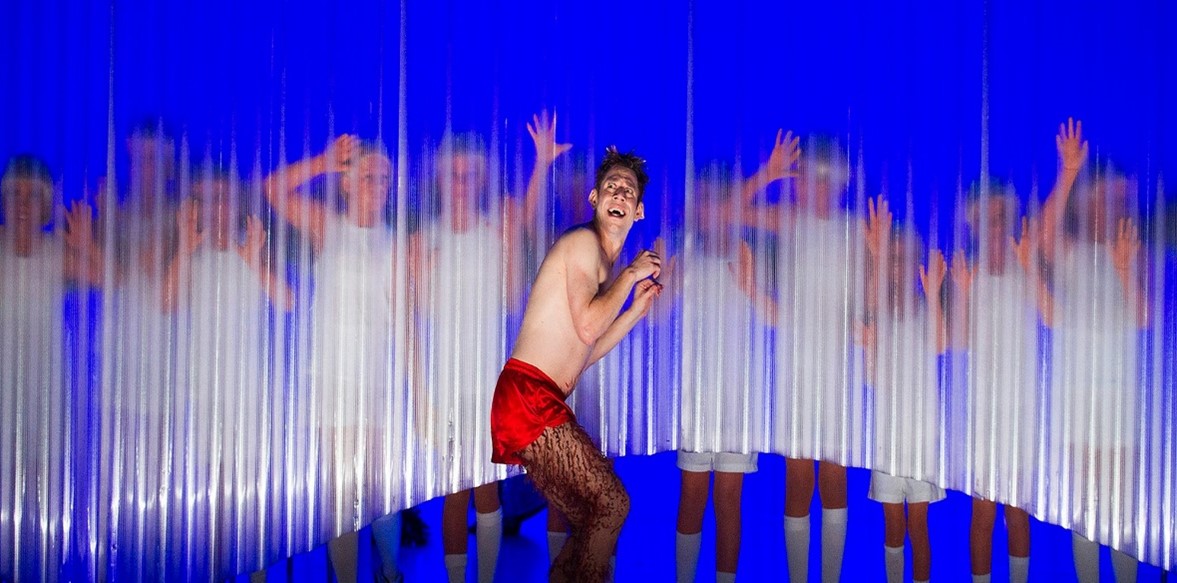Opera North’s spellbinding production of A Midsummer Night’s Dream captures the ethereal beauty of Britten’s music whilst putting the fun back into Shakespeare.

A Midsummer Night’s Dream (Benjamin Britten) | The Lowry, Salfrod | 13th of November 2024
Reviewed by Paul Knowles
The moment the ethereal humming of the synth starts to reverberate around the Lowry theatre, I become hypnotically lulled. It’s as if I’m sharing the same mesmerisation that the characters experience under the influence of the love potion. The semi-translucent plastic screens (that make up the production’s staging of the Athenian forest) ascend into the ceiling. I am in store for a truly wonderful night as I watch this majestic, chaotic and devastatingly beautiful production of Opera North’s sixties’ version of A Midsummer Night’s Dream.
The opera begins with the fairy’s enchanting lullaby, performed by a chorus of child actors, metamorphosing into a nightmarish, folkish version of ring-a-ring-a-roses. Subsequently, an animalistic Puck in tiny, fluorescent red shorts (played with raw magnetism, by Daniel Abelson) pounces onto the stage to present the action of the opera. We are then introduced to Oberon, the Fairy King, and Tytania, the Queen, both garbed in Bowie spaceman outfits. The couple are fighting over the custody of an orphaned boy who was born to Tytania’s handmaiden. Afterwards, we witness the four lovers’ (Helena, Lysander, Hermia, and Demetrius) flight into the Athenian woods. This opening twenty-minute salvo is a wonderful introduction to the show’s two adversary themes — what does true love consist of versus the hypocrisy of desiring someone only due to their looks, status, or money— that form the centrifugal core at the heart of Britten’s opera.
The constant clashing of these antithetical themes is reflected in both the characters’ actions and the opera music’s transformation from low and melodic to chaotically high-pitched and back again within a single act. Furthermore, these thematic adversaries are mirrored in the range of operatic voices on display. From the restrained, controlled, and regal Oberon (which is the perfect vehicle for the talented James Lang’s superb vocal control) contrasting with the delightfully comical Bottom (played with real gusto by Henry Waddington) whose vocals are full of bravado and unintentional comedy. These conflicts and harmonisations are effectively reflected in the forest scene, where the four sweethearts, under the influence of Puck’s mischievous application of the love potion go from lovers to rivals to lovers again. Hermia (Siân Griffiths) displays wonderfully, the confusion of feeling deserted by Lysander in the middle of the forest with her vocal performance full of agonising self-doubt as she worries at the harm that could have befallen him. Helena (Camilla Harris) is the ideal foil for Hermia, her more realistic and world-weary performance highlighting how Hermia has never been anything but the object of Lysander and Demetrius’ affection, whilst Helena has still been in Hermia’s shadow. James Newby, gives a bold vocal performance that captures the haughty and self-entitled Demetrius, conveying how self-pompous Demetrius is, in his belief that his money gives him the right to Hermia’s hand in marriage. Lysander is played with wonderful honesty by Peter Kirk, his vocal performance capturing Lysander’s growing confidence that he will be the best suitor for Hermia. All four singers work in perfect harmony to evoke the passion, confusion and self-doubt that falling in love entails.
Undoubtedly, the Mechanicals add much comedy and bathos to the Opera as they aspire to better themselves by performing at Thesus and Hippolyta’s upcoming nuptials. They work wonderfully together to form a fantastic comic ensemble. A special mention needs to be given to Dean Robinson who captures the frustrations of an aspiring director to a tee. In addition, Nicholas Watts adds much needed gravitas to Thisbe’s death, cutting through the slapstick comedy behind the tour-de-force that is the Mechanical’s performance of Pyramus and Thisbe. Conductor (Garry Walker) showcases a masterclass of control as he expresses the passion, disorder, and beauty of Britten’s music. The Director (Martin Duncan) should be applauded for giving licence to his singers to perform the comic scenes of Midsummers with such verve and energy. Duncan’s version of Britten’s opera encapsulates the folk and comic elements of Midsummers that has kept the play and opera a firm favourite of the young and old alike. Opera North’s sixties’ version of A Midsummer Night’s Dream is a must see! A brave and innovative production that captures the ethereal beauty of Britten’s music whilst also putting the fun back into Shakespeare.
To conclude, these shadows have not offended but thrilled, delighted and dazzled me over the Opera’s three-hour running time.
Reviewed by Paul Knowles
